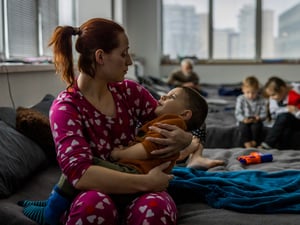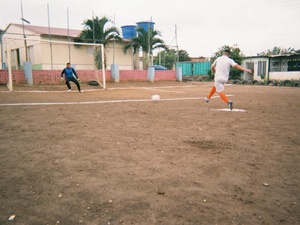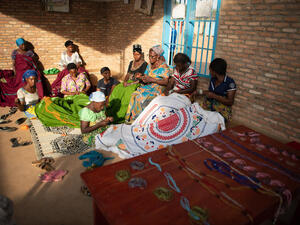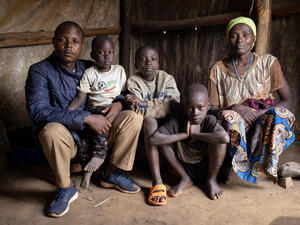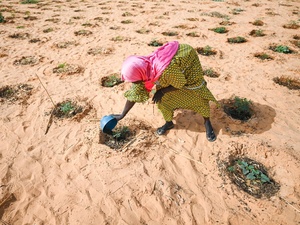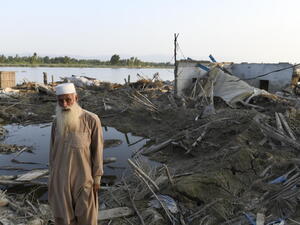Refugee athletes' epic journey toward Tokyo Games dramatized in new video
What does it feel like to run for your life?
A new video released today by UNHCR, the UN Refugee Agency, dramatizes the arduous journey refugee athletes and Para athletes have taken – from escaping war and persecution to training for a chance to participate in the 2020 Tokyo Olympic and Paralympic Games.
“The Journey” presents a fictional story of a young woman forced to flee her country to escape violence. As gunfire erupts, she takes off through dusty roads wearing flip-flops. After a dangerous journey by land and sea to reach safety, she endures challenges as a refugee in a strange country, before finding purpose through sport.
The film was made in collaboration with two IOC Refugee Athlete Scholarship-holders, who are among more than 60 refugee athletes and Para athletes training for the chance to compete in the Tokyo Games this summer.
"Sport has the power to change the life of...displaced people."
Rose Nathike Lokonyen, a refugee from South Sudan who carried the flag for the first-ever Refugee Olympic Team in Rio de Janeiro in 2016, advised on the video. Rose fled tribal warfare in South Sudan with her family when she was just eight years old. They eventually found safety in Kakuma Refugee Camp in Kenya, where Rose made friends through football.
In 2015, when the International Olympic Committee’s (IOC) Refugee Olympic Team held trials at the camp, a teacher suggested Rose enter the 10,000 metres race. It earned her a spot on the Refugee Olympic Team, for which she competed in the 800 metres race at Rio.
Now a High Profile Supporter for UNHCR, Rose advocates for bringing educational and sports opportunities to refugee children. Rose now lives and trains at the Tegla Loroupe Refugee Athletes’ Training Centre in Ngong, near the capital Nairobi. Like many athletes around the world, she has been forced to tailor her training to account for lockdowns imposed due to the COVID-19 pandemic. Still, she hopes to continue her own journey in Tokyo.
“When we marched into Maracanã Stadium [in Rio]…people were really welcoming us… We felt like we were human beings,” Rose said. “Sport has the power to change the life of others, especially displaced people.”
“The Journey” was created for UNHCR, in partnership with the IOC and International Paralympic Committee (IPC), by award winning agency Don't Panic and directed by Pantera through Anonymous Content. It is being released on 6 April, the UN’s International Day of Sport for Development and Peace.
Ibrahim Al Hussein, a Syrian Refugee and Paralympic swimmer now living in Greece, competed in the 2016 Paralympic Games in Rio de Janeiro and is currently training in the hope of competing as part of the Refugee Paralympic Team in Tokyo.
“Sport is my life. If I stopped training I think my life would stop. When I’m swimming, it may be tiring, but it helps me stop thinking about my impairment and makes me feel good,” Ibrahim said.
"Sport is my life."
“I wish there was no need for a Refugee Olympic and Paralympic Team, that there was no more blood in the streets or war in the world, and that every athlete could train under their country’s flag.” Ibrahim added. “But my participation in the Rio Paralympic Games was a key moment in my life – it opened new doors for me and for other refugee athletes too.”
The IOC and UNHCR created the Refugee Olympic Team, which first competed in the Rio Olympics 2016. The team had ten athletes, including two swimmers, two judokas, a marathoner and five middle-distance runners. They came from Ethiopia, South Sudan, Syria and the Democratic Republic of the Congo.
At the Rio 2016 Paralympic Games a small team of refugee athletes, known as the Independent Paralympic Athletes team (IPA), participated for the first time. UNHCR and IPC have been working together since 2016 to provide refugees with life-changing access to Para sports and ensure a more inclusive and equal world.
The announcement of the Tokyo 2020 Team (competing in 2021) has not yet been made.



